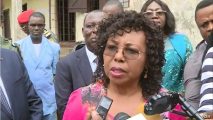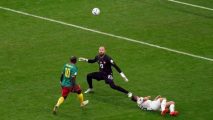Categories
Recent Posts
- Biya regime pledges to repay 616M CFA Francs to Baccalaureate examiners
- France: Marine Le Pen barred from running for public office for five years
- FECAFOOT: Unity prevails amid Eto’o-Brys tensions
- Yaoundé: EYUMEMA welcomes Honorable Rose Abunaw
- CPDM Covid Scandal: Prosecutor seeks 10-Year ban for 4 officials
Archives
- March 2025
- February 2025
- January 2025
- December 2024
- November 2024
- October 2024
- September 2024
- August 2024
- July 2024
- June 2024
- May 2024
- April 2024
- March 2024
- February 2024
- January 2024
- December 2023
- November 2023
- October 2023
- September 2023
- August 2023
- July 2023
- June 2023
- May 2023
- April 2023
- March 2023
- February 2023
- January 2023
- December 2022
- November 2022
- October 2022
- September 2022
- August 2022
- July 2022
- June 2022
- May 2022
- April 2022
- March 2022
- February 2022
- January 2022
- December 2021
- November 2021
- October 2021
- September 2021
- August 2021
- July 2021
- June 2021
- May 2021
- April 2021
- March 2021
- February 2021
- January 2021
- December 2020
- November 2020
- October 2020
- September 2020
- August 2020
- July 2020
- June 2020
- May 2020
- April 2020
- March 2020
- February 2020
- January 2020
- December 2019
- November 2019
- October 2019
- September 2019
- August 2019
- July 2019
- June 2019
- May 2019
- April 2019
- March 2019
- February 2019
- January 2019
- December 2018
- November 2018
- October 2018
- September 2018
- August 2018
- July 2018
- June 2018
- May 2018
- April 2018
- March 2018
- February 2018
- January 2018
- December 2017
- November 2017
- October 2017
- September 2017
- August 2017
- July 2017
- June 2017
- May 2017
- April 2017
- March 2017
- February 2017
- January 2017
- December 2016
- November 2016
- October 2016
- September 2016
- August 2016
- July 2016
- June 2016
Featured
Most Commented Posts
 4 Anglophone detainees killed in Yaounde
4 Anglophone detainees killed in Yaounde
18 comments Chantal Biya says she will return to Cameroon if General Ivo Yenwo, Martin Belinga Eboutou and Ferdinand Ngoh Ngoh are sacked
Chantal Biya says she will return to Cameroon if General Ivo Yenwo, Martin Belinga Eboutou and Ferdinand Ngoh Ngoh are sacked
13 comments The Anglophone Problem – When Facts don’t Lie
The Anglophone Problem – When Facts don’t Lie
12 comments Anglophone Nationalism: Barrister Eyambe says “hidden plans are at work”
Anglophone Nationalism: Barrister Eyambe says “hidden plans are at work”
12 comments Largest wave of arrest by BIR in Bamenda
Largest wave of arrest by BIR in Bamenda
10 comments
Latest Tweets
Featured
-

Biya regime pledges to repay 616M CFA Francs to Baccalaureate examiners
-

France: Marine Le Pen barred from running for public office for five years
-

FECAFOOT: Unity prevails amid Eto’o-Brys tensions
-

Yaoundé: EYUMEMA welcomes Honorable Rose Abunaw
-

CPDM Covid Scandal: Prosecutor seeks 10-Year ban for 4 officials
-

Cameroon still faces power cuts despite full output from Nachtigal Dam
-

Financial scandal rocks Mkpot Oil Mill Project!! Manyu Chiefs won’t talk
© Cameroon Concord News 2025





22, September 2018
Cameroon violence worsens in power struggle over language 0
Violence in Cameroon between English-speaking militants and the security forces of the francophone-led country is threatening to spiral out of control ahead of October elections.
Hundreds of thousands of people have been displaced in the past year by bloody clashes between Cameroonian soldiers and armed separatists calling for independence for roughly 5m citizens in the country’s English-speaking regions.
The violence across the country’s linguistic divide — which has its roots in colonialism — has turned into the greatest challenge faced by President Paul Biya, who hails from Cameroon’s francophone majority and has been in power for 36 years.
Hans De Marie Heungoup, central Africa senior analyst for the International Crisis Group, said: “We are not yet in a civil war, but all the ingredients for a potential civil war are already assembled.”
He cited the targeting of civilians, the administration’s efforts to encourage pro-government militias and the emergence of criminal gangs.
The election due on October 7, when 85-year old Mr Biya is seeking his seventh term in office, comes days after the anniversary of a government crackdown that left dozens of protesters dead last October, when secessionists symbolically proclaimed the independence of Ambazonia, as the envisioned anglophone state is called.
The crisis began in 2016 as the Biya administration accelerated policies that have marginalised English speakers and cracked down violently on peaceful protests against demands that French be spoken in schools and courts in anglophone regions.
Agbor Nkongho, a leader of the protest marches who was jailed for eight months, said: “After we were arrested, the movement went into the hands of radicals who were clamouring for a separate state. The situation has changed drastically . . . and tensions will only get worse as we approach October 7.”
Mr Ngongho said more English speakers had been persuaded to support what had been a minority secessionist movement because of extrajudicial killings, the arbitrary arrest and torture of journalists and civilians, and the blocking of internet access in anglophone regions last year.
The ICG estimates that soldiers have burnt at least 100 anglophone villages to the ground — part of a crackdown that has forced more than 21,000 people to flee into neighbouring Nigeria.
In the past year, the anglophone armed groups, directed from abroad by exiled Cameroonians in Europe and the US, have grown more brazen and violent, said Mr De Marie Heungoup. They are made up of between 1,000 and 3,000 men, most armed with rudimentary weapons such as machetes and hunting rifles, according to ICG.
Amnesty International said this week that around 400 civilians have been killed this year in the crisis, while at least 160 soldiers have died since 2016. The human rights group also said it had authenticated two videos showing someone who identified himself as a separatist holding the decapitated head of a Cameroonian officer.
“The situation is going to deteriorate further because [anglophone separatists] are going to use all means possible to prevent elections from taking place” in their region, says Elie Smith, a Cameroonian journalist. “And in retaliation the military will use brutal force.”
Jean de Dieu Momo, a Biya supporter and head of Les Patriotes Démocrates pour le Développement du Cameroun political party, said that anglophone grievances about marginalisation are legitimate, but added that so were those of pygmy tribesmen in the bush who were not taking up arms.
Mr de Dieu Momo said he supported anglophone efforts at reform within the Cameroonian state. But the men who took up arms for a separate state “are not political fighters fighting for the change of the state to federalism — they are terrorists”, he said. “They are taking money from the population, they are raping the women [and forcing] people to put the flag of Ambazonia on their door.”
In 1961 French Cameroun and the former British Southern Cameroons were unified, uneasily, in a federation that gave the anglophone regions autonomy. In 1972, Cameroon was “united”, effectively giving the francophone majority complete control. Since then, Anglophones have complained of being marginalised and oppressed.
Julius Nyugap, a member of Ambazonia’s self-proclaimed government, says the international organisations accusing separatists of human rights violations have bought “the narrative of the government”, which wants to paint them as terrorists. “Why would we kill the very people we are fighting for?” he says.
Mr Biya rules by decree, and has instituted anti-democratic policies abolishing term limits while allowing a façade of multi-party democracy that, critics charge, provides him cover with the international community, which has largely been silent about the anglophone crisis.
Cameroon is “an ‘electoral dictatorship’. . . so you will get the impression of a country where there are democratic freedoms”, says Kaw Wallah, an opposition politician who has called for an end to Mr Biya’s rule. But “any time the Biya regime feels threatened in any way . . . you can be arrested either as a journalist, as an opposition member, or as a civil society activist.”
Source: Financial Times